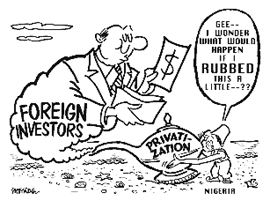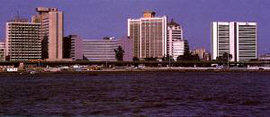
| 
|
 |
 NIGERIA
NIGERIA
A new business climate |

Business - Economy - Lean and clean - Core issues - Home truth -
Oil business - Private sector - Banking 
 nigeria, A new business climate nigeria, A new business climate
These days nigeria is not short of celebrity endorsements. Harvard Professor, Jeffrey Sachs, wants the G8 enlarged to a G16 that includes nigeria: "A G16 for the new Millenium should include old and new democracies such as Brazil, India, South Korea, nigeria, Poland and South Africa". nigeria, an aspirant to political and economic regional power status, has just come in from the cold. Its new democratic order is being guided by President Olusegun Obasanjo, who once worked the world diplomatic circuit with past leaders of Germany, Britain, Canada and the United States. President Jimmy Carter was in nigeria early in the year to monitor the election that brought his old friend back to power.
At the May 29 inauguration of the new democratic government, Nelson Mandela lent his presence, a palpable role model image, that Obasanjo, as much as any other African leader, must walk in. As the year wore on, France's Jacques Chirac came calling, as also did America's energy secretary, Bill Richardson. nigeria in rebounce has, in turn, been on a drum beat blitz across Africa.
Obasanjo who once sought the post of secretary general of the United Nations has Africa and the world on his mind as he cranks nigeria's rusty political and economic machinery to life. The president's African tours have been relentless.
As the world reaches out to a reawakened nigeria, Obasanjo is anxious to lift hearts across a despondent continent. Salim Ahmed Salim, secretary general of the Organization of African Unity (OAU) sees President Obasanjo as a man of experience who will provide strong leadership: "He has the capacity to build democratic structures. I have no doubt that he will consolidate the recent democratic gains of his country which come at a time when in some smaller African countries, there is a reverse trend. Africa indeed expects a lot from this new nigeria."

By his first 100 days in power, the president had set a breath-taking pace of administration and earned due praise from the press and the populace. Nonetheless, the best is yet to come. Says Obasanjo: "We've just begun. One thinks that we need to lay a solid foundation for all that we have to do. We have to change the orientation as part of correcting measures. We are not living as an island and some people are looking at what is happening in nigeria".
Indeed, a lot has happened in nigeria in the wake of democracy. Critics say Obasanjo has instituted an imperial presidency with messianic pretensions. The legislature has poised itself to check an overreaching executive. Yet the law makers have become the whipping boy of the public and the press.
Relentless press scrutiny exposed the speaker of the House of Representatives as a fraud and he had to resign. Faced with a similar barrage, the Senate President escaped by the skin of his teeth. Meanwhile an over-active presidency has been goading the legislature to get down to the business of making laws. The legislature, prone to distractions, has been crossing swords with the executive. Senator Arthur Nzeribe charges the administration with subverting the legislature and hatching ill-digested policies. "Anxiety to identify and prosecute popular wishes of the day has led the regime into haste in preparing bills and proclaiming policies without adequate homework," he says.
His examples include the anti-corruption bill, streamlining of the armed forces, Niger Delta commission and the supplementary budget. Obasanjo's budget for the rest of 1999 endured a tedious passage through the legislative mill. His bill for a law that creates a development commission for the oil-rich but long-neglected Niger Delta is mired in deep-seated misgivings by the target beneficiaries. Nzeribe has proposed a law against corruption which he says is superior to what Obasanjo has on the cards.
While the government's version of the impending anti-corruption law will prohibit and punish corrupt practices, Nzeribe says his own version seeks to go beyond that to probe and recover existing wealth stolen from the public treasury over the past fifteen years.
He adds: "By and large, this regime will fail or succeed on how it prosecutes its corruption war. Does President Obasanjo really have the courage, moral platform and confidence to fight corruption? I believe he does. Majority of nigerians also do".Nzeribe's brutally frank thesis on the Obasanjo administration can be challenged but not ignored:"The fundamental problems which constituted the central theme of the Obasanjo administration at the beginning of the regime are still begging for attention and redress. The problems are social justice and equity, enthronement of true democracy and economic prosperity". Obasanjo says the first 100 days has shown his government's coloration and "the direction generally of where we are going which is clear now".
|
Where will we go from now on, he asks and answers: "Economic issues will engage our attention". He sees present policy hiccups as part of the learning process. Among the more commendable actions of the new administration is the retirement of the politicized top echelon of the military. There is also the appointment of a panel to probe and review contracts wrongly awarded by previous governments. Another high-powered body, headed by a retired supreme court judge is saddled with a comprehensive appraisal of various human rights abuses by past regimes.
While analysts concede that the executive is taking a number of good steps, they stress the importance of carrying along the other arms of government and the public. nigeria's recent history has left a groundswell of public distrust of government.
The military administrations exacerbated the ethnic division of the country. Part of the momentum that brought Obasanjo to power was the strident calls for power shift from the North to the South. The North has produced the country's heads of state for 34 out of 39 years since the country gained independence. When a southerner from the Yoruba tribe, Chief MKO Abiola won the presidential election in 1993 and the Northern military rulers annulled the election, the country tottered on a precipice for five years. This period saw a heightening of primordial loyalties. Tribal political groupings and associations mushroomed. The country was held together mainly by the oil revenue that flows to the center and the military force the government will not hesitate to use in quelling any attempt by any ethnic group to pull out of the country.
To appease for the injustice of annulling the 1993 election the last presidential election was between two Yoruba contestants. Now more than ever before, the country is sentenced to playing ethnic politics. The Obasanjo government has gone out of its way to give top level appointments to major ethnic groups identified by states. This notwithstanding, many ethnic groups in the North and South claim to be marginalised in the new dispensation.
President Obasanjo has a thesis on ethnicity: "The ethnic factor exists more with the elites who want power and office. They are the people we have to watch. It is the elite that deserves special appeal as the ordinary people do not pose any danger to the unity and peace of the nation".

The country with a population of 120 million has about 300 ethnic nationalities, according to Chief Ojo Maduekwe , the minister of culture and tourism. He adds: "Our duty here in the ministry of culture is to show nigerians a mirror of themselves. A total picture that will accentuate the positive and that self re-discovery will be able to raise motivation, raise commitment, create a better sense of the country. The duty of the ministry of culture is to create a greater respect for each other's culture; it is a multi-cultural society and in a diversity of cultures fashion out a sense of a nation, not just a country, but a sense of a nation for people to make ultimate commitment towards development. They have to respect the diversity of the nation and even feel that there is a nation worth living and dying for."Obasanjo's cabinet has a very broad ethnic representation.
This has given his government a high moral ground in a continuing war of words with chauvinists of various colorations. In containing the elites and winning the support of the broad masses, Obasanjo's main achievement so far may have been in restoring credibility to government.
After stepping down as military ruler twenty years ago, Obasanjo cultivated the land and his intellect. From his Ota Farms issued books, reports and articles seeking societal reordering. African Leadership Forum, a think tank he founded, posed myriad developmental challenges to Africa's leadership class. Now that he is back as a refined headboy, he has the task of taking his own medicine by providing good government, even by African standards. |
© World INvestment NEws, 1999.
This is the electronic edition of the special country report on nigeria published in FORBES Magazine,
October 18 th issue.
Developed by AgenciaE.Tv |
|
|
|
| |
| | | |
|

